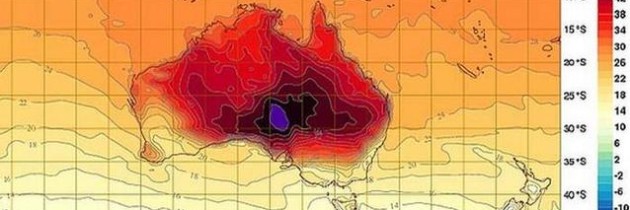Australian heatwave shows man-made climate change, scientists say
Southern Australia is caught in the grip of an extreme heatwave, which is fuelling hundreds of bush fires, causing power cuts and even prompting concerns about the safety of tennis players in the Australian Open, which is being staged in Melbourne. Scientists say these heatwaves are one of the clearest examples of man-made climate change beginning to stand out from natural climate variability.
Temperatures climbed above 40C in Melbourne on Wednesday for a second successive day forcing at least one more player to retire and prompting a debate about whether it is simply too hot to play tennis during the afternoon. The forecast for Thursday is 44C.
Australia’s second severe heatwave in a fortnight follows confirmation by the Bureau of Meteorology that 2013 was the country’s hottest year on record. Average temperatures were 1.2C above the long-term average, breaking the previous record set in 2005 by 0.17C.
“Rising temperatures in Australia are a signal of climate change that has emerged very clearly from recent analysis,” said Peter Stott, head of climate monitoring at the UK Meteorological Office Hadley Centre. “Last year’s temperatures were a long way outside the envelope of variability that we would expect in the absence of climate change.”
Climate change is harder to detect unambiguously in regions such as northwest Europe where there is greater natural variability. “Temperatures in the Arctic have risen by more than those in Australia but the signal there is not as clear,” added Mr Stott.
Sarah Perkins, an expert on Australian climate extremes at the University of New South Wales, pointed out that the latest heatwaves were taking place in the absence of El Niño, the periodic warming of the tropical Pacific Ocean. “We usually expect to see hotter temperatures at higher frequencies during an El Niño phase, yet we’ve seen hot event after hot event when the modes of climate variability are not conducive to this,” she said.
When El Niño returns, heatwaves may become even more severe – bad news for summertime events such as the Australian Open.
“Today, 30 minutes after the match I could not walk,” said Ivan Dodig, a Croatian tennis player on Wednesday. “I was thinking I could maybe even die here.”
On Tuesday, Canadian qualifier Frank Dancevic suffered hallucinations and collapsed on court. “I was dizzy from the middle of the first set and then I saw Snoopy and I thought, ‘Wow Snoopy’, that’s weird,” said Mr Dancevic. “I couldn’t keep my balance any more and I leaned over the fence and when I woke up people were all around me.”
More seriously, extreme heat poses risks to both humans and wildlife. “When average conditions are exceeded over a period of time by continuously high night-time and daytime temperatures, heat stress becomes a critical factor in human survival and infrastructure resilience,” said Alisdair Hainsworth, assistant director for weather services at the Australian Bureau of Meteorology.
The heatwave raises the risk of bush fires, with the fire brigade in Victoria still fighting dozens of blazes sparked by lightning strikes on Tuesday. Victoria Fire Services Commissioner Craig Lapsley says the peak fire danger will come on Friday, when winds are expected to pick up.
Electricity demand has reached record levels in the heatwave prompting blackouts in some areas. Ten thousand homes lost power in Melbourne on Wednesday afternoon and the government in Victoria has warned that 100,000 properties may face power cuts in the next two days.
Despite the rising temperatures, the coalition government of Prime Minister Tony Abbott, which was elected in September, has promised to scrap a carbon tax introduced to cut carbon emissions and axed the Climate Commission – a body set up to provide reliable information on climate change. In October last year during wild fires in New South Wales, Mr Abbott denied there was any link between bush fires and climate change.
He recently appointed Maurice Newman, a climate sceptic and trenchant critic of the Intergovernmental Panel on Climate Change, as chairman of the prime minister’s Business Advisory Council. In an article in the Australian newspaper on Wednesday, Mr Newman said the IPCC was “captured by the green movement” and said he could not reconcile the claims of dangerous human emissions of carbon dioxide with the observed record.
Fonte: ft.com



